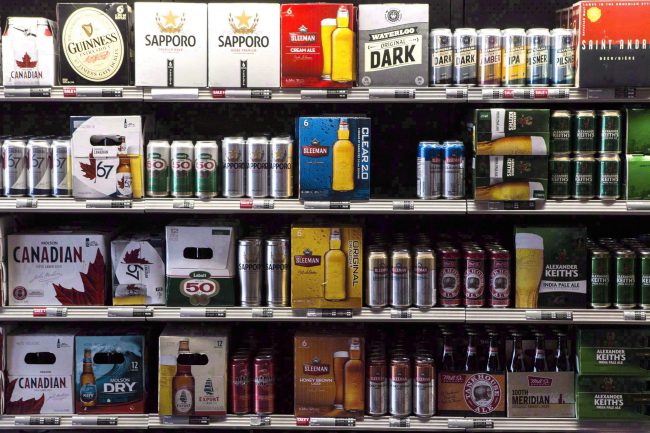Canada’s big brewers are sounding the alarm about rising beer taxes that they say dwarf those south of the border, and are responsible for hurting beer drinkers in the pocketbook.

Earlier this week, the trade association representing Canada’s biggest brewers issued a report slamming the “dramatic and unsustainable” rise in beer taxes.
“What should be particularly concerning to Canadian beer drinkers is the fact that Canadian beer taxes, and the tax difference with the U.S., are both growing rapidly because of hidden government tax measures like the federal government’s new automatically escalating excise tax and Ontario’s indexed Basic Beer Tax,” Beer Canada said in its press release.
However, experts say the big beer companies bear more responsibility for rising prices than the government’s beer tax regime.
READ MORE: Big brewers say Liberals should cancel increasing beer tax as consumption trends down
“While we know beer drinkers understand that Canadian beer taxes are high, we don’t think they really understand how high they are and how they actually work,” said Beer Canada president Luke Harford.
“This is because virtually all these beer taxes are built into the shelf price and are hidden from the consumer’s view. Many of these hidden taxes, both provincially and federally, go up automatically every year without any debate, public announcement or notification to Canadians.”
The federal government is defending its beer tax regimen, pointing out that the 2017 budget increased excise tax rates on alcoholic beverages by two per cent, in line with inflation.
“It’s worth remembering that the last effective increase to the federal excise tax was over 30 years ago,” Finance Canada spokesperson Chloe Luciani-Girouard told Global News.
She added that Canadian brewers will enjoy decreased tax rates on the first 7.5 million litres of beer, “saving small brewers anywhere between $56,000 and $763,000” annually.
“The annual inflationary adjustment will provide alcohol producers with greater certainty in the future and is in line with actions taken by many provinces.”
WATCH: Canada’s ‘free the beer’ case loses in Supreme Court

But the government’s explanations have done little to appease Beer Canada, which has set up a website and social media presence dedicated to its “Axe the Beer Tax” campaign.
The website states that i) Canadians pay five times as much beer tax as American beer-drinkers, ii) 47 per cent of the price of beer is in fact government tax and iii) The excise beer tax will continue to rise.

Get daily National news
But that’s not the entirety of the story, according to Toronto-based beer expert and historian Jordan St. John.
For one, he points out that Beer Canada’s “47 per cent tax” cry only applies to a handful of beer-brewing behemoths that churn out product above the volume at which higher beer tax rates kick in.
READ MORE: Class-action lawsuit over Beer Store prices dismissed by Ontario court
He also adds that big beer brands are going to raise their prices every year no matter what, and that the escalating excise tax comprises an insignificant portion of the yearly increases.
Taking the example of a two-four of discount brand beer, St. John says prices go up around $1.50 a year, and the excise tax only accounts for about a dime’s worth of that increase.
He calculated that the big brewers — the only ones who will pay the 47 per cent tax rate — will still make an extra 8.27 cents per litre on their discount brands.
“The question you have to ask is, ‘Are these big brewers going to fix the price of discount brand beer for the little guy? Are they going to lobby against the government for that?’ They’re pocketing more money every year and they just don’t want to pay a proportional rate of tax on it.”
Beer Canada has argued that “hard-working middle-class beer drinkers already pay too much beer tax.” But St. John says Big Beer’s arguments have left him with a bitter taste in his mouth.
“The amount of tax that the big brewers are paying has nothing to do with the price of beer going up. They’re just trying to turn the public against the idea of taxing the company. It’s pretty underhanded,” he said.
https://twitter.com/axethebeer_tax/status/994996096328855552
It also bears mentioning that three of the big five brewers are foreign-owned — MolsonCoors is headquartered in Denver, Colo., Labatt is owned by Belgian-Brazilian brewing giant A-B In-Bev, while Sleeman is owned by Japanese brewery Sapporo.
“They’re essentially waging a propaganda war in order to try and get the residents of Canada not to tax them. The profits are going overseas,” said St. John.
READ MORE: 1.5 per cent price increase on alcohol tax now in effect
Propaganda war or not, why are Canada’s beer taxes so much higher than those in the U.S.?
St. John says it’s because Canada’s provinces are bigger than the 50 American states for the most part, and also because so-called sin taxes are needed to help pay for social services.
“We have universal healthcare, which they don’t. We’ve got programs that we’re paying for as part of our society, and sin tax goes to help to have those things,” St. John explained. “In the United States, you’re probably going to go bankrupt in an emergency room trying to pay off a gunshot wound. We don’t have that problem.”








Comments